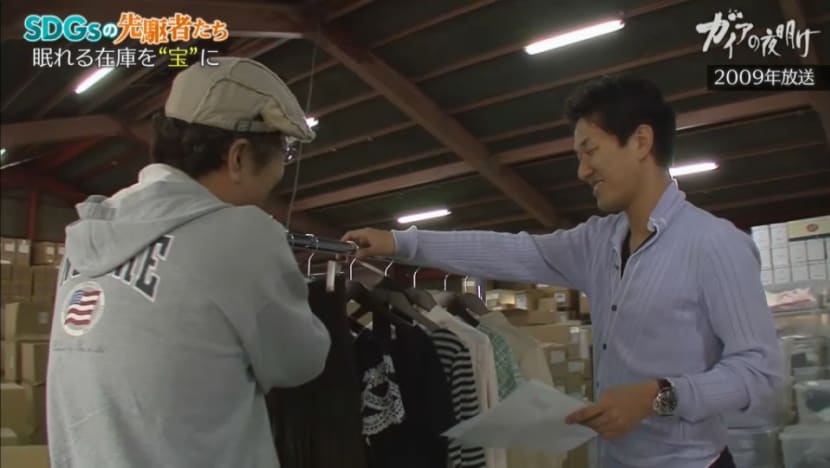Gaia Series 39: Pioneers Of The Sustainable Development Goals
Pioneering sustainable business models in Japan, entrepreneurs Shoichi Yamamoto and Naoko Kimura are creating value from waste.


This audio is generated by an AI tool.
Pioneering sustainable business models in Japan, entrepreneurs Shoichi Yamamoto and Naoko Kimura are creating value from waste.
This week’s episode takes us into the heart of Tokyo's Sumida Ward, to the Kinshicho Marui shopping centre which is home to a revolutionary retail concept. Shoichi Yamamoto’s store, Colors, is making waves with its unique approach to sustainability and affordability. This store offers garments at astonishingly low prices, with tags showing reductions from 13,000 yen to a mere 100 yen. It’s part of Yamamoto's broader strategy to combat clothing waste: Approximately 290 million items of clothing are produced annually in Japan alone and nearly 150 million garments go unsold.
Colors isn’t just about selling clothes at lower prices; it’s about creating a sustainable business model that supports social inclusion. Most notably, the store employs individuals with disabilities, integrating them into all aspects of the operation from sales to the recycling processes that turn unsold stock into reusable fabrics. This initiative not only provides much-needed jobs but also helps to reduce the environmental impact of textile waste.
The store’s pricing strategy is radical; Racks of knitwear, originally priced at 4,000 yen, now available for 110 yen; skirts that might have retailed for 8,500 yen offered at similarly slashed prices. As one customer puts it, finding a high-quality skirt that costs less than a cup of coffee elsewhere seems almost unbelievable but is a regular occurrence here.
This approach draws attention to the often-overlooked value of older or unsold stock that many stores would simply discard. By repurposing these clothes – with their tags cut off so it does not devalue the brand - Yamamoto’s business helps to mitigate the environmental damage caused by the fashion industry, which is exacerbated by mass production and minimal recycling.
One of the store’s innovative practices includes a dynamic pricing model where prices drop over time if items aren’t sold. This encourages customers to visit often and purchase items they might not consider otherwise, knowing that prices might be lower if they wait. It's a model that has caught the eye of consumers and industry insiders alike, prompting discussions about how the fashion industry can move towards more sustainable practices.
Yamamoto’s influence extends beyond Japan. In Cambodia, he has replicated his business model to help local economies. By selling surplus Japanese clothing at low prices in Cambodian markets, he supports local employment and offers affordable clothing options to economically disadvantaged communities. This international expansion is a testament to the scalability and adaptability of his business philosophy.
Through his stores, Yamamoto is setting a new standard for the fashion industry. His commitment to recycling, reducing waste, and supporting communities is paving the way for a more sustainable and inclusive future. By transforming how we think about unsold clothes and who works in our stores, he is showing that fashion can be a force for good, driving change that benefits both the planet and its people.
Parallel to Shoichi's efforts in Tokyo, another Japanese entrepreneur, Naoko Kimura, has embarked on a similar path of innovation but in a different sector. Based in Aomori, Naoko has founded her company, Mizuiro, which produces crayons made from discarded vegetables. These crayons are not only environmentally friendly but also serve as an educational tool for children to learn about sustainability.
Naoko's journey began when she noticed the amount of waste produced by the agricultural sector, where vegetables that are slightly imperfect are often discarded. Seeing an opportunity, she started creating crayons from these vegetables, giving them a new life. Her products quickly gained popularity across Japan for their unique concept and contribution to reducing waste.
The vegetable crayons come in various colours, each representing a different vegetable. They are sold in stores nationwide and have been well received due to their quality and the story behind them. Naoko's initiative highlights how businesses can effectively turn waste into a valuable resource while educating the public about environmental sustainability.
Both entrepreneurs have shown that with creativity and commitment, it is possible to create business models that are both profitable and sustainable. They have also demonstrated the importance of social responsibility, proving that businesses can play a crucial role in solving social issues through innovative thinking and entrepreneurial spirit.
These stories of innovation and commitment to sustainability and social inclusion are shaping the future of business not only in Japan but globally. As more entrepreneurs and businesses adopt similar models, the potential for significant positive impact on the planet and its people continues to grow.












